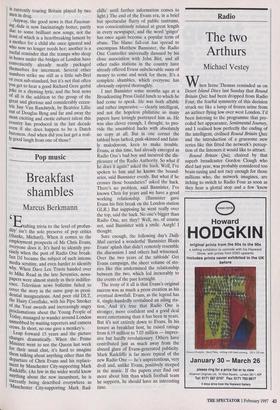Radio
The two Arthurs
Michael Vestey
When Irene Thomas reminded us on Desert Island Discs last Sunday that Round Britain Quiz had been dropped from Radio Four, the fearful symmetry of this decision struck me like a lump of frozen urine from an airliner flying low over west London. I'd been listening to the programme that pre- ceded her appearance, Sentimental Journey, and I realised how perfectly the ending of the intelligent, civilised Round Britain Quiz and the introduction of a gruesome new series like this fitted the network's percep- tion of the listeners it would like to attract.
Round Britain Quiz, chaired by that superb broadcaster Gordon Clough who died last year, was probably considered too brain-taxing and not racy enough for those millions who, the network imagines, are itching to switch to Radio Four as soon as they hear a glottal stop and a few 'know wha' I mean, like'. Arthur Smith, who, I'm guessing, must be a comedian, took Arturo Scargill to Cuba, the old rabble rouser's favourite country after, well, Libya I sup- pose.
For Scargill, Cuba was perfect. Fidel Castro, whom he'd met, was a kindly, benign figure in power with popular sup- port. There were happy, smiling faces everywhere. The two Arthurs were enjoy- ing themselves drinking daiquiris and breathing in the air of freedom which the great Yorkshire booby Scargill thought dis- tinguished Cuba from most other coun- tries. Castro was the longest-serving leader in the world, he noted approvingly, forget- ting to tell us that Cubans had no choice in the matter, and that most of the intelligent ones had fled abroad.
Scargill, we were led to believe, really is human as he loves a Havana night-spot with dancing girls and, you know, has a sense of humour. At the forefront of my mind, though, as I listened to this hideous programme was the realisation that Scargill, more than any other individual, brought about the destruction of the British coal industry. Every time Smith rather feebly expressed doubts about Cuban communism, Scargill dodged the issue, something he's very good at, as I remember from my interviews with him on picket lines or in radio studios. Overall, the programme gave us no idea what the coun- try was really like. On Sunday, it's the turn of Janet Street-Porter, God help us, anoth- er ideal new Radio Four stereotype.
Scargill probably wouldn't like Zimbab- we, despite its socialist leader and what has become, in effect, a one-party state. Sixteen years after independence, though, it has survived the election of Robert Mugabe and his segment of the Patriotic Front which fought a vicious war against the Smith regime. In an excellent series on Radio Four, The Red Hills of Home, six res- idents, black and white, reflect on their lives. There are few interruptions from the producer-presenter Paul Dodgson, though the steel band-type background music was intrusive. The country's economy is weak but it would have been worse if Mugabe hadn't reassured the whites when he took over, unlike his friend Samora Machel in neighbouring Mozambique who frightened the Portuguese away and with them all the skills required to run a country.
The beauty of the Zimbabwean land- scape is breathtaking, with mountains in the east, lakes and game parks in the west and, of course, the Victoria Falls. When I first went there for the BBC in 1979 it was like stepping back into 1950s Britain; white Rhodesians hadn't noticed the 1960s except to declare UDI. Men still opened doors for what they called 'ladies', and probably still do. The series opened with a white tobacco farmer called David whose grandfather came from Cornwall. David recalled how astounded he'd been when Mugabe had won the election, assuming that Bishop Muzorewa would triumph. Blacks told their employers they'd be vot- ing for the bishop as they thought, rightly, that's what they wanted to hear.
In the second edition, Pepe, a successful black Mashona businesswoman in Mutare, formerly Umtali, in the east, had come a long way from her Harare township, now called the more politically correct 'high density suburbs'. She and her family live behind high security walls as crime is a seri- ous problem which it hadn't been before independence. She said she could never forgive the whites for their policies of racial discrimination and although she had white friends she didn't allow herself to get too close to them. Still, Zimbabwe is one of the few relative success stories of Africa despite its many problems and that's a trib- ute to both blacks and whites. The blacks, I found, were among the most pleasant and talented in Africa and the whites were guilty of merely being behind the times; they lacked the dogma and hardness of the Afrikaner to the south. These Thursday evening programmes last 15 minutes but they're so enjoyable I could have happily listened to twice that length.



























































 Previous page
Previous page